 It's received almost zero attention or notice, but the Republican appointees to the Federal Election Commission on Thursday tried to overturn a bedrock principle of American democracy: transparency of contributions and the identities of donors to political campaigns. The move caught us here at The BradCast by surprise, but we feel slightly better after hearing that our guest today, one of the nation's foremost experts on campaign finance, also just learned about this unprecedented effort. [Audio link to full show follows this summary.]
It's received almost zero attention or notice, but the Republican appointees to the Federal Election Commission on Thursday tried to overturn a bedrock principle of American democracy: transparency of contributions and the identities of donors to political campaigns. The move caught us here at The BradCast by surprise, but we feel slightly better after hearing that our guest today, one of the nation's foremost experts on campaign finance, also just learned about this unprecedented effort. [Audio link to full show follows this summary.]
BUT FIRST UP... Two unusual rulings from the packed, stolen and corrupted U.S. Supreme Court. Unusual for several reasons. One, because both oppose rightwing advocacy. Two, because a majority of rightwingers on the Court voted in favor of both of them. And three, because the Court's liberals voted in a bloc against one of them! We try to make sense of all of that for you today in each of the two rulings.
One came late on Wednesday, when the Court invoked the so-called Purcell Principle, which prevents changes to election rules, laws and district maps too close to an election, theoretically in order to avoid confusion by voters or election administrators. But this principle is opportunistically invoked by the rightwing Court when they feel like it --- even it means allowing, for example, the use of a U.S. House District map that has been found unconstitutional by the courts --- and ignored when they don't.
Their unsigned shadow-docket ruling [PDF] on Wednesday, however, invoked Purcell to allow a U.S. House District map that was newly approved by Louisiana's GOP-controlled legislature. It adds a second Black-majority voting district in the state after its previous map was found to be in violation of the Voting Rights Act following a years-long legal fight. But after the new map was approved by the state earlier this year, a group of self-described "non-Black voters" sued, claiming the new map was an unlawful racial gerrymander. A 3-judge panel on the 5th Circuit agreed and ordered a new new map. That is the order that was blocked on Wednesday by SCOTUS, allowing the second Black-majority district to stand as is, at least for 2024, even as the Court's liberal Justices, to the surprise of many, voted in against the rightwing majority. If you're confused as to why, tune in! We explain all!
The other unusual SCOTUS ruling came today, via a 7 to 2 majority opinion [PDF] written by Justice Clarence Thomas(!) and opposed only by fellow rightwing Justices Sam Alito and Neil Gorsuch. The majority opinion rejected an effort by the sleazy payday lending industry to kill the federal Consumer Financial Protection Bureau (CFPB).
The CFPB was the brainchild of Elizabeth Warren during the Obama Administration, before she became a U.S. Senator. It was created on the heels of the subprime mortgage crisis that led to the Great Recession. To avoid industry influence on funding of the federal government's only consumer-oriented agency, it was housed inside of the Federal Reserve and allowed to draw up to $600 million per year for its budget, rather than go through the Congressional appropriations process each year. The payday lender group filed suit to argue the CFPB's funding mechanism ran afoul of the Constitution's Appropriations Clause and, therefore, all of the CFPB's actions since its 2010 founding, including billions of dollars in fines leveed against their industry, must all be rolled back and the agency dissolved.
Thomas, the Court's liberals, and three more of its Republican appointees flatly rejected the lender's case. They held that, though its funding mechanism is somewhat outside the norm, Congress may still change the way it is funded at any time. Also, as the majority opinion notes, there have been other agencies, such as the Customs Service and USPS, which have had similar, non-annual standing appropriations since the founding of the country.
NEXT... On Thursday, the Federal Election Commission (FEC) held an historic vote on a new rule to allow campaign donors to remain anonymous if they claimed that allowing their identities to become public would lead to harassment. The Federal Election Campaign Act (FECA) already allows some very rare exceptions for members of groups who are shown to have been historically harassed by the U.S. Government itself. Beyond that, however, allowing for campaign donors to remain anonymous challenges the very basis of our system of open, transparent, democratic elections.
We're joined today by CRAIG HOLMAN, longtime government affairs and ethics lobbyist at the non-profit watchdog Public Citizen. He is helping to lead the fight against this startling effort headed up by Trump-appointed FEC Commissioner Alan Dickerson.
The new rule "cuts into the very fabric of a functional democratic society," argues Public Citizen in its public comment against the rule. They note it would "vastly expand the donor [disclosure] exemption far beyond its original purpose, would undermine effective disclosure of the sources of political spending, deprive voters of critical election information, swamp the FEC under a wave of new paperwork, and runs contrary to the core mission of the agency." Other than that, it's great!
"What I really find astounding is that people of all partisan persuasions, Democrats and Republicans, have always believed in disclosure," Holman tells me today. "That's the one pillar of campaign finance law that no one has really come out against. The Republicans may come out against contribution limits, regulation of money in politics, but they always say to have transparency so we know where the money is coming from. This is the very first time that the FEC has encroached upon that principle."
The good(ish) news for now, is that he reports the Commission deadlocked, in a three-to-three vote along partisan lines today. That kills it for the moment. Though, in a second vote today, Holman says they agreed to ask the FEC's General Counsel to study the matter and report back in 75 days. That, he says, is likely to result in a second attempt by Dickerson later this year. Holman says he knows Dickerson to be a "hardcore deregulation" supporter. But "this is the first time the FEC has addressed the actual issue: 'Should we just get rid of disclosure altogether?'"
"Fortunately the FEC deadlocked," Holman says. But "that means three Republicans were saying 'Yes, let's get rid of disclosure!' That's frightening. We only defeated this resolution by a deadlock vote."
Holman has much more on "how absurd" Dickerson's proposal is, and the fact that "it caught us all by surprise." He also fills us in on a petition that he has filed for a new FEC rule that will be voted on next month regarding mandatory disclosure by campaigns when they use deepfake audio and video, created by Artificial Intelligence, to mislead voters.
FINALLY... Desi Doyen joins us for our latest Green News Report, as wildfires continue to explode in Canada; Broadcast media continues to ignore Donald Trump's billion-dollar quid pro quo proposal to Big Oil donors; and Joe Biden takes on China regarding the sale of electric vehicles and solar panels in the U.S...
[NOTE: The BradCast will be off at the beginning of next week due to a family funeral. We'll be back soon!]
(Snail mail support to "Brad Friedman, 7095 Hollywood Blvd., #594 Los Angeles, CA 90028" always welcome too!)
|


 'Green News Report' 1/6/26
'Green News Report' 1/6/26
 Trump's War on Venezuela is About Ego, Power, Creation of 'Alien Enemies': 'BradCast' 1/5/26
Trump's War on Venezuela is About Ego, Power, Creation of 'Alien Enemies': 'BradCast' 1/5/26 Sunday 'Peace President' Toons
Sunday 'Peace President' Toons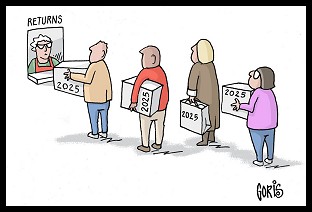 Sunday 'Many Happy Returns' Toons
Sunday 'Many Happy Returns' Toons Have a Holly Jolly Somehow
Have a Holly Jolly Somehow 'Tis the Sunday Before Christmas Toons
'Tis the Sunday Before Christmas Toons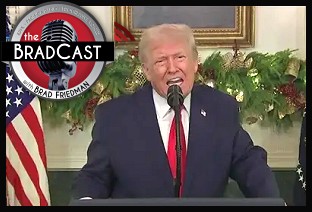 Old Man Shouts at People from White House for 20 Minutes, and Other Year-End Matters: 'BradCast' 12/18/25
Old Man Shouts at People from White House for 20 Minutes, and Other Year-End Matters: 'BradCast' 12/18/25 'Green News Report' 12/18/25
'Green News Report' 12/18/25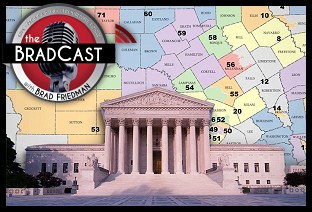 SCOTUS Ruling a How-To for Unlawful Gerrymandering on 'Eve' of Critical Election Year: BradCast' 12/17/25
SCOTUS Ruling a How-To for Unlawful Gerrymandering on 'Eve' of Critical Election Year: BradCast' 12/17/25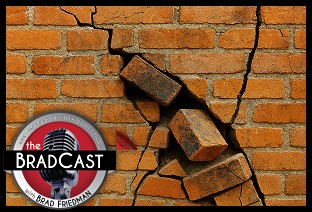 Bricks in the Wall: 'BradCast' 12/16/25
Bricks in the Wall: 'BradCast' 12/16/25 'Green News Report' 12/16/25
'Green News Report' 12/16/25 'This One Goes to 11': Weekend of Violence, Murder of Rob Reiner: 'BradCast' 12/15
'This One Goes to 11': Weekend of Violence, Murder of Rob Reiner: 'BradCast' 12/15 Sunday 'WTF?' Toons
Sunday 'WTF?' Toons Trump Now Losing One Battle After Another: 'BradCast' 12/11/25
Trump Now Losing One Battle After Another: 'BradCast' 12/11/25 'Green News Report' 12/11/25
'Green News Report' 12/11/25 Dems Continue Stunning 2025 Election Streak: 'BradCast' 12/10/25
Dems Continue Stunning 2025 Election Streak: 'BradCast' 12/10/25 Petrostates and Propa-gandists Undermining Climate Science: 'BradCast' 12/9/25
Petrostates and Propa-gandists Undermining Climate Science: 'BradCast' 12/9/25 The High Cost of Trump's Terrible Policy Making: 'BradCast' 12/8/25
The High Cost of Trump's Terrible Policy Making: 'BradCast' 12/8/25 Dems Fight to Avoid GOP's Year-End Health Care Cliff: 'BradCast' 12/4/25
Dems Fight to Avoid GOP's Year-End Health Care Cliff: 'BradCast' 12/4/25 A 'Flashing Red Warning Sign' for GOP: 'BradCast' 12/3/25
A 'Flashing Red Warning Sign' for GOP: 'BradCast' 12/3/25 Hegseth, War Crimes and DoD's 'Politicization Death Spiral': 'BradCast' 12/2/25
Hegseth, War Crimes and DoD's 'Politicization Death Spiral': 'BradCast' 12/2/25 Follow the
Follow the 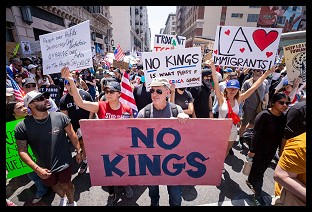 With Thanks, No Kings and Good Cheer
With Thanks, No Kings and Good Cheer
 VA GOP VOTER REG FRAUDSTER OFF HOOK
VA GOP VOTER REG FRAUDSTER OFF HOOK Criminal GOP Voter Registration Fraud Probe Expanding in VA
Criminal GOP Voter Registration Fraud Probe Expanding in VA DOJ PROBE SOUGHT AFTER VA ARREST
DOJ PROBE SOUGHT AFTER VA ARREST Arrest in VA: GOP Voter Reg Scandal Widens
Arrest in VA: GOP Voter Reg Scandal Widens ALL TOGETHER: ROVE, SPROUL, KOCHS, RNC
ALL TOGETHER: ROVE, SPROUL, KOCHS, RNC LATimes: RNC's 'Fired' Sproul Working for Repubs in 'as Many as 30 States'
LATimes: RNC's 'Fired' Sproul Working for Repubs in 'as Many as 30 States' 'Fired' Sproul Group 'Cloned', Still Working for Republicans in At Least 10 States
'Fired' Sproul Group 'Cloned', Still Working for Republicans in At Least 10 States FINALLY: FOX ON GOP REG FRAUD SCANDAL
FINALLY: FOX ON GOP REG FRAUD SCANDAL COLORADO FOLLOWS FLORIDA WITH GOP CRIMINAL INVESTIGATION
COLORADO FOLLOWS FLORIDA WITH GOP CRIMINAL INVESTIGATION CRIMINAL PROBE LAUNCHED INTO GOP VOTER REGISTRATION FRAUD SCANDAL IN FL
CRIMINAL PROBE LAUNCHED INTO GOP VOTER REGISTRATION FRAUD SCANDAL IN FL Brad Breaks PA Photo ID & GOP Registration Fraud Scandal News on Hartmann TV
Brad Breaks PA Photo ID & GOP Registration Fraud Scandal News on Hartmann TV  CAUGHT ON TAPE: COORDINATED NATIONWIDE GOP VOTER REG SCAM
CAUGHT ON TAPE: COORDINATED NATIONWIDE GOP VOTER REG SCAM CRIMINAL ELECTION FRAUD COMPLAINT FILED AGAINST GOP 'FRAUD' FIRM
CRIMINAL ELECTION FRAUD COMPLAINT FILED AGAINST GOP 'FRAUD' FIRM RICK SCOTT GETS ROLLED IN GOP REGISTRATION FRAUD SCANDAL
RICK SCOTT GETS ROLLED IN GOP REGISTRATION FRAUD SCANDAL VIDEO: Brad Breaks GOP Reg Fraud Scandal on Hartmann TV
VIDEO: Brad Breaks GOP Reg Fraud Scandal on Hartmann TV RNC FIRES NATIONAL VOTER REGISTRATION FIRM FOR FRAUD
RNC FIRES NATIONAL VOTER REGISTRATION FIRM FOR FRAUD EXCLUSIVE: Intvw w/ FL Official Who First Discovered GOP Reg Fraud
EXCLUSIVE: Intvw w/ FL Official Who First Discovered GOP Reg Fraud GOP REGISTRATION FRAUD FOUND IN FL
GOP REGISTRATION FRAUD FOUND IN FL

































